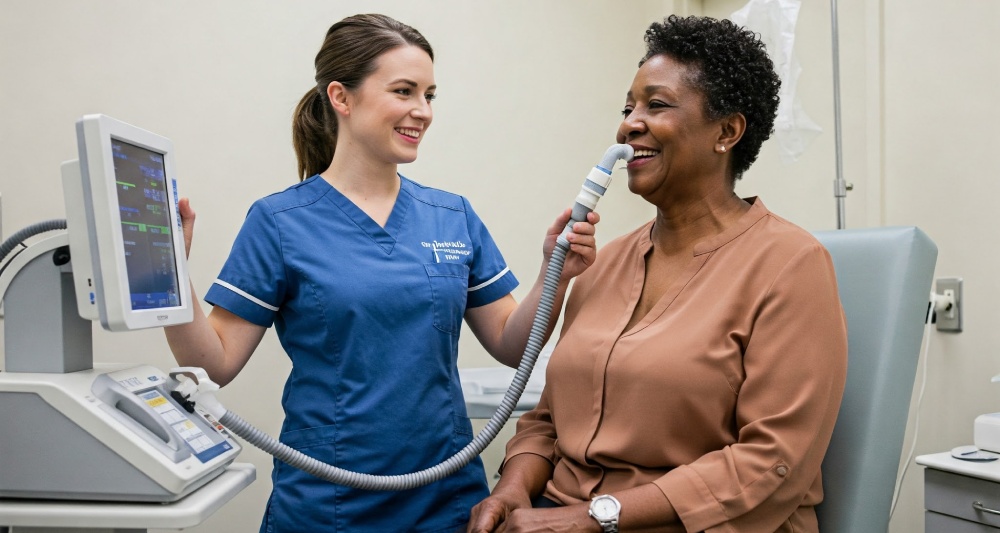If you’re booking a private health check or full body MOT, you might notice a spirometry test listed in the package. But what exactly is it, and why is it worth doing?
A spirometry test is a simple, painless breathing test that helps measure how well your lungs are working. It’s one of the most common ways to check your lung function, and it can detect problems even if you don’t feel any symptoms yet.
In this post, we’ll explain what a spirometry test is, what it measures, and why it might be included in your private health screening.
What Is a Spirometry Test?
A spirometry test checks how well you can move air in and out of your lungs. You take a deep breath, then blow out as hard and fast as you can into a mouthpiece that’s connected to a machine. The machine records how much air you blow out and how fast you do it.
It only takes a few minutes and is completely safe. Some people might feel a little light headed afterward, but that usually goes away quickly.
What Does a Spirometry Test Measure?
Spirometry focuses on two key things:
- FEV1 (Forced Expiratory Volume in 1 second): How much air you can force out in one second.
- FVC (Forced Vital Capacity): The total amount of air you can blow out after taking a deep breath.
The FEV1/FVC Ratio of these two measurements helps doctors see if there’s a blockage or restriction in your airways.
Here’s a helpful video about Spirometry from the British Medical Journal:
What Can a Spirometry Test Detect?
A spirometry test can pick up early signs of several common conditions, including:
- Asthma
- Chronic Obstructive Pulmonary Disease (COPD)
- Emphysema and chronic bronchitis
- Reduced lung function from smoking
It can also help doctors monitor existing lung conditions or check how well treatment is working.
Why Is Spirometry Included in Private Health Screens?
Private health check ups in the UK often include spirometry because it gives valuable information about your breathing and lung health. Here’s why it’s useful:
- It helps spot issues early, even if you feel healthy
- It gives peace of mind for current or former smokers
- It’s helpful if you’ve ever had symptoms like wheezing, coughing, or breathlessness
- It’s a good idea for people with allergies or a family history of asthma
Some health screens include spirometry as standard, while others offer it as an add on.
What Happens After the Test?
Your results will be reviewed by a doctor or health professional. If the numbers are lower than expected, they might:
- Recommend more tests (like a chest X-ray or allergy testing)
- Give you lifestyle advice, like quitting smoking or using an inhaler
- Suggest a follow up in a few months to track any changes
Even if your results are normal, it’s great information to have for your records.
Spirometry FAQs
What is a spirometry test used for?
It checks how well your lungs are working and can detect conditions like asthma or COPD.
Do I need to prepare for a spirometry test?
Try not to eat a big meal or smoke just before the test. Wear loose clothing so it’s easier to take deep breaths.
How long does a spirometry test take?
Just a few minutes. The whole process, including instructions, usually takes 10–15 minutes.
Is spirometry included in private health checks?
Yes, many private health assessments include it as standard or offer it as an optional add on.
About our Content
skreen is not a medical provider and does not diagnose or treat conditions. Our content is informational and should not replace professional medical advice.
We’re serious about being a trusted source of information and sharing only the highest quality, medically reviewed content. You can review our Content & Editorial Policy here.




